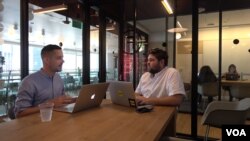“Brand strategist” Phil Pallen travels from city to city to meet with clients, individuals and companies who want to shape their image through traditional and social media.
“A few weeks ago, I was in an airplane for 41 hours of that week,” said the Los Angeles-based marketer and publicist, “and I actually did a full loop around the world — LA, Europe, Middle East, Asia, back to LA.”
He recently helped launch a gourmet food truck in Australia, taking a trans-Pacific flight for the opening.
Pallen has no fixed office, but works from the shared workspaces of a company called WeWork, which has 200 locations in 50 cities around the world. Other entrepreneurs have created similar co-working spaces, and they are common in Silicon Valley, the tech hub around San Francisco where a single shared space can house scores of tech startups.
WATCH: Mike's video report
Charles Du, a software product manager from California who spoke to VOA via Skype, travels the world as a digital nomad and teaches others about the lifestyle. He says most of his fellow nomads are also technical workers, but not all.
“I've met account managers who work with clients remotely, and lots of marketing people,” said Du. “I’ve met nursing faculty, people that teach for universities and they conduct their entire classes online.”
An office when on the road
Co-working spaces are also used by accountants, lawyers and other professionals who do much of their work by computer but need to travel to meet with clients, says WeWork's director of public relations, Taylor Patterson.
“We have folks who may have their home base in Los Angeles, but travel to London frequently,” she said, and when they get there, they have office space with Wi-Fi and other amenities.
Working from the same Los Angeles location as Phil Pallen, actress and producer Fanny Veliz operates a business called Avenida Productions, which finances and produces films through online crowd-sourcing sites such as Indiegogo.
Veliz helps filmmakers get their projects off the ground and says that her company focuses “on diversity, creating opportunities for people of color and other under-represented groups in the entertainment business.”
She works wherever she needs to, setting up shop as needed in various parts of Los Angeles or other U.S. cities, or in Mexico.
Local vs. global
In Los Angeles or New York the limits are disappearing, says an expert in technology and business. The ability from work remotely "changes someone's creativity level," says John Maeda, a former MIT professor and former president of the Rhode Island School of Design who spoke via Skype.
“Local has a harder time competing now with global,” he said, and for a product or services aimed at a market, for example, in New York, “someone who lives farther away from New York can create something and sell it in New York instantly, or in Beijing, or anywhere.”
Working remotely opens new vistas for “knowledge” workers, said analyst Maeda, while industries such as construction are necessarily tied to a physical location, and at least for today, the mobility of knowledge work is part of the digital divide that separates workers.
Internet makes it easy to move
Growing hubs for digital nomads include low-cost resorts such as Ubud on the Indonesian island of Bali and Chiang Mai in northern Thailand, said Charles Du, who has worked in both. He has also worked in cities in Europe and Latin America.
He said the challenges include finding housing, friends and new shared work space in a new location, but that with the internet, it is becoming increasingly easy.
Brand strategist Pallen says working from various places, he can see “how other people live around the world, that inspires the work that I do day to day.”







